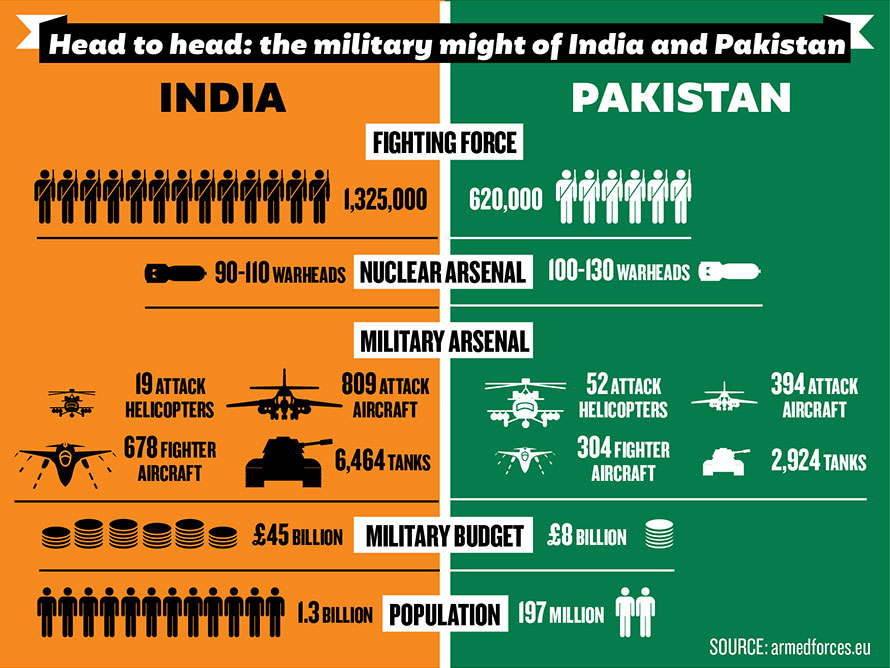The world holds its breath as Pakistan shoots down an Indian jet and the two historic enemies trade threats. A top scientist has warned that war between them could cause two billion deaths. 07:36 Pakistan claims it has shot down two Indian fighter jets and captured an Indian pilot. 07:43 Pakistan shuts down its airspace. 08:05 India claims to have shot down a Pakistani fighter jet. 08:19 Stock markets in India and Pakistan nosedive. 09:09 Pakistan releases video of a captured Indian pilot with blood on his face. 10:19 Pakistan releases a photo of the burning wing of an Indian jet. 10:20 Pakistan's former interior minister, claims that Indian Prime Minister Narendra Modi is deliberately stoking hostilities to win votes in an April election. 10:26 Pakistan's prime minister, Imran Khan, addresses the nation on TV. 11:19 Meeting of the National Command Authority that controls Pakistan's nuclear arsenal. 12:19 Indian's prime minister meets his heads of security and intelligence. 13:40 India demands the safe return of its pilot. 14:48 US Secretary of State Mike Pompeo pleads with India and Pakistan to avoid "further military activity". Two nuclear powers, the second and the sixth biggest nations by population on our planet, seemingly hurtling towards war. Yesterday, with nightfall, came respite. Today, the world holds its breath, well aware of the furnace that could so easily be sparked in the tinder-dry litter of grievances that lie between Asia's historic enemies after generations of mutual distrust. Divided by religion (Pakistan 97% Muslim, India 80% Hindu), torn apart by history, with their armies facing each other across a 460-mile disputed border known as the "line of control", their media and politicians trading accusations day after day, the main quarrel between Pakistan and India is the disputed region of KashmirThe region was not allocated to either India or Pakistan in the original partition. It is still a disputed territory, as both countries claim authority over it.. Former US President Bill Clinton called Kashmir "the most dangerous place in the world". Part of the reason is that Pakistan has a history of close support from China and India has defence agreements with America with a clear risk of both superpowers being drawn into a wider war. The US atmospheric scientist Brian Toon predicts that even a small-scale nuclear war between India and Pakistan would cover the entire Earth with smoke, destroying up to 40% of global yields of corn, wheat and rice for years afterward and killing about two billion people through starvation. Back from the brink With stakes so high, will sense prevail? Millions have taken to Twitter to #saynotowar. The prime minister of Pakistan tried to calm things down calling yesterday for "sense and wisdom". But doesn't history offer chilling warnings? The Football War, the Kettle War, the War of Jenkins' Ear, the Anglo-Abyssinian War - all deadly conflicts fought for reasons far more trivial than what is happening today between Pakistan and India. KeywordsKashmir - The region was not allocated to either India or Pakistan in the original partition. It is still a disputed territory, as both countries claim authority over it.
The world holds its breath as Pakistan shoots down an Indian jet and the two historic enemies trade threats. A top scientist has warned that war between them could cause two billion deaths.
Back from the brink
Keywords
Kashmir - The region was not allocated to either India or Pakistan in the original partition. It is still a disputed territory, as both countries claim authority over it.
Nuclear powers India and Pakistan on red alert

Glossary
Kashmir - The region was not allocated to either India or Pakistan in the original partition. It is still a disputed territory, as both countries claim authority over it.
